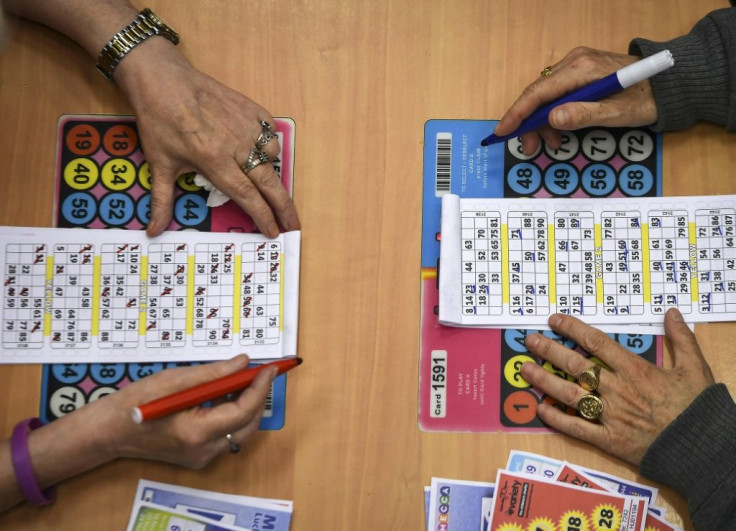In Britain's Bingo Capital, Love For The Game Endures

Most nights of the week, Margaret Fisher can be found sitting in the same seat in the same Glasgow bingo club she has been frequenting for nearly 25 years.
"All my friends have been playing forever -- I've not really spoken to anybody who's never been in a bingo hall," the 70-year-old Glasgow resident told AFP, easing into a game in the bingo-loving city.
"I'm not a gambler but I do like bingo... the atmosphere and the adrenalin rush when you're playing.
"You meet friends, have a good time and it gets you out and about," Fisher said, shortly after paying £5 ($6, 6 euros) entry to take her regular spot next to the lucky charm-laden table of her friend Tina.
Historically beloved by British grandmothers, the game sees players win payouts if they match sets of numbers between one and 90 announced by a caller -- traditionally shouting "bingo!" when they mark off all their numbers.
Fisher said that she had once scooped £2,000 in prize money. But normally players at her club can hope to win up to £1,000 at Sunday night games and up to half that midweek.
Unlike other gambling games, bingo tends to attract more women than men.
Analyses show the ratio is typically 80:20 women to men, according to The Bingo Association chief executive Miles Baron, a former marketing chief for the Rank gambling company.
In British cities -- Glasgow in particular -- bingo has also been strongly associated with the working class, often handed down from one generation to the next.
"My mum went with her gran, and then as soon as I was old enough she was like 'you're coming to bingo!'" said 22-year-old Nicole Croly, also at the gargantuan club, run by gaming brand Mecca, in the city's gritty East End.
"I've just been hooked on it ever since."
'Bingo in the DNA'
Bingo is believed to have originated in Italy in the 16th century, spreading to neighbouring European countries and beyond over the centuries.
It had its heyday in Britain in the 1960s but its popularity continues in some places, none more so than in Glasgow.
At least 14 clubs remain across Scotland's biggest city and its suburbs, more than anywhere else in Britain, according to The Bingo Association.
The number was at least twice that however in the 1980s, albeit smaller venues, Baron said.
"We're quite happy to say they invented it but we own it," said Paul McGlinchey, who manages the 1,500-seat club -- the country's biggest by capacity.
"There's no doubt about it: Glasgow loves its bingo," he added, as around 500 players, predominantly older women, filled row after row of brightly coloured seats and tables beneath fluorescent lights.
McGlinchey said the enduring communities around the bingo clubs, despite an increasingly mobile population elsewhere in Britain, had kept bingo "in the DNA" of the city.
Locals put its popularity down to the fun-loving and sociable nature of Glaswegians.
The infectiously jovial manager keeps up with everything from customers' hip operations to wedding anniversaries.
"I know everything like that. That's my job to know that," he added.
"It's like a soap opera every day in here -- the things you hear!"
Mecca has shed some of the traditional strictures of the game, such as maintaining absolute silence when numbers are being called out by offering sections in which people can chat whilst playing.
It has also embraced technology, offering digital pads to play on instead of traditional paper number books, and staging pop music-fuelled nights aimed at a younger clientele.
Attracting a new crowd
Across town at a trendy converted industrial space on the banks of the River Clyde -- once famous for its mighty shipbuilding -- a new iteration of the game has abandoned almost all its usual etiquettes.
"Bongo's Bingo", played in a nightclub-style setting enlivened by music, alcohol and plenty of sexual innuendos from the hosts, is attracting the Friday night party crowd.
"I'm going to get drunk and try win some money!" said Steven Ward, 26, who is there with friends.
Launched in Liverpool in 2015 and since introduced in other British cities as well as internationally, Bongo's has proved particularly popular in Glasgow -- where it now sells out weekly to 700 customers.
Rich Kelly, 33, a former drama teacher from Birmingham, was calling the numbers and DJ'ing at a recent night.
Flanked by two male colleagues dressed in drag, he handed out prizes including cash, liquor and a cardboard cutout of a daytime TV personality, as the crowd danced to occasional blasts of cheesy pop hits.
"You know the crowd is going to be really up for it."
Lyn Lappin, at 51 one of the oldest in attendance and usually a player at a more traditional venue, had ventured down with work colleagues.
"I love it... It's absolutely magic!" she said, drink in hand, joining in a raucous rendition of Neil Diamond's "Sweet Caroline" during a break from the numbers.
© Copyright AFP 2024. All rights reserved.




















